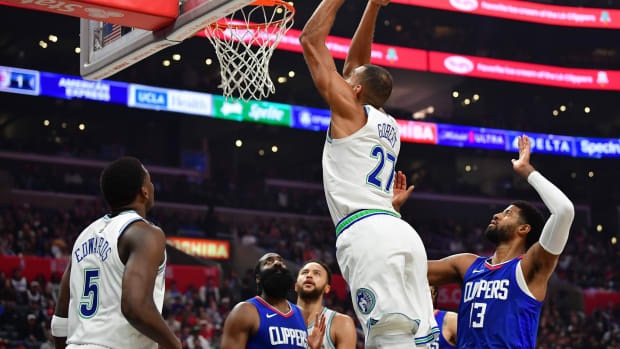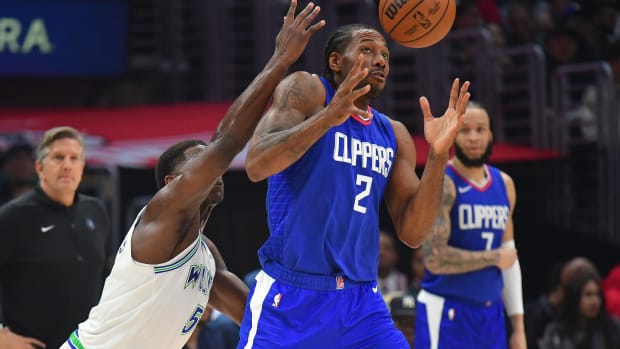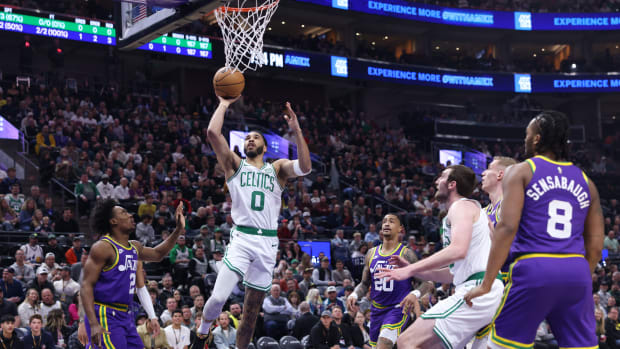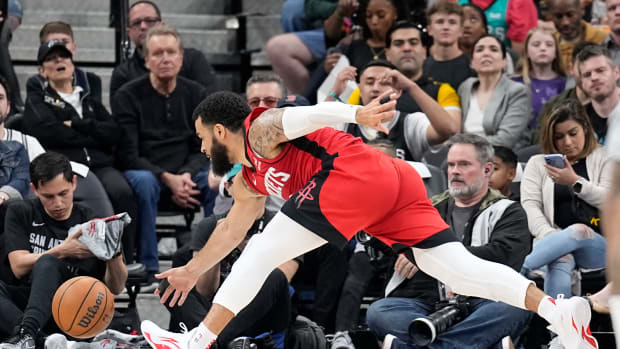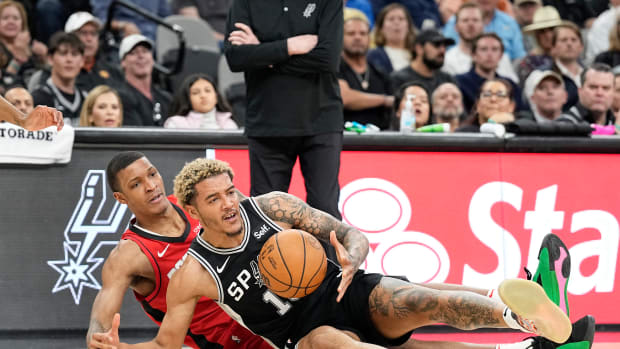The NBA Has Chosen Its Path Against COVID-19
NEW ORLEANS – The Pelicans and Trail Blazers played on Tuesday night.
That’s it. That’s the story, with the NBA caught in a COVID-19 wave. Nine games (and counting) have been postponed so far. More than 100 players have entered health and safety protocols this month. In the last week, the league has added about 10 more players to the list each day. On Tuesday, Adam Silver confirmed during an ESPN interview that the omicron variant is responsible for roughly 90% of the NBA’s new cases. Silver called omicron “beyond dominant.”
Some have suggested the NBA pause its season. Silver isn’t one of them.
“Frankly, we are having trouble coming up with what the logic would be behind pausing right now,” Silver said. “As we look through these cases literally ripping through the country, let alone the rest of the world, I think we're finding ourselves where we sort of knew we were going to get to over the past several months, and that is this virus will not be eradicated, and we're going to have to learn to live with it.”
In a few short weeks, the omicron variant has swept through the U.S. More than 73% of new coronavirus cases are omicron, per the CDC. In the Northwest and Southeast, omicron accounts for 95% of the circulating virus, and omicron cases nationwide are doubling every three days.
The NBA’s new reality is that you are just as likely to see a roster of G-Leaguers than NBA regulars right now. Everyone from Isaiah Thomas to Charlie Brown is wearing an NBA uniform. After playing 22 minutes for Dallas on Tuesday, Theo Pinson admitted he didn’t know any of the plays his teammates were calling.
A pause to allow teams to get players back would seemingly make sense. But would a pause amount to anything more than a delay? Silver doesn’t think so.
On Tuesday, I asked Pelicans coach Willie Green whether he was comfortable with the league’s decision.
“I’m very comfortable with it,” says Green. “These are circumstances not just the NBA, but the whole world is navigating. There are some difficulties that come along with that. That being said, I think we’re learning more and more about COVID, just in general. The NBA has done an awesome job … of trying to navigate these different circumstances. We still have to be safe and do everything that we can to protect ourselves. It’s just the world that we live in right now that we have to continue to try to navigate.”
Indeed. The NBA’s priority isn’t beating COVID-19—it’s navigating it. It has to decide when to test. Players have expressed frustration at being sidelined despite being asymptomatic. One player told me he was informed he tested positive just as he was heading to the gym to work out. Trae Young, in response to a question on Twitter asking whether he would miss the Hawks’ Christmas Day game against New York, tweeted: “Hope not #asymptomatic.”
The NBA could solve some of its COVID-19 issues by simply not testing as much. It’s an approach the NFL is taking. But the NBA seems to be taking a different tack. The league intends to increase its testing between Dec. 26 and Jan. 8, a stretch that covers Christmas and New Year’s. That will undoubtedly lead to more players landing in protocols and impacting the integrity of the games, something Silver, frankly, didn’t seem overly concerned with.
“There’s a real sense of brotherhood among the guys in this league,” Silver said. “There’s a sense of partnership among the teams. I also think there is a broader responsibility. Sports have been a bellwether of sorts in our society. … Our ability to find a way to keep operating is also significant for society, to show that there are ways, despite living in this COVID era, that we can find a safe and responsible way to keep going.”
The focus, Silver said, is to get as many players three-shot vaccinated as possible. Perhaps the most interesting piece of information Silver revealed Tuesday was that there were very few breakthrough cases for players who had been fully vaccinated and boosted. “Only a very small number of those people have been breakthrough cases where they've turned positive,” Silver said. The NBA has a 97% vaccination rate. Around 65% of those players have received a booster, a number Silver—and the players union—desperately wants to see grow.
“To me, the focus is on boosters for the 97% of players who have been vaccinated,” Silver said. “As I said before, among those players who are eligible to get boosters … there's a waiting period after your second shot, but among those who are eligible to be boosted, we are about 65%, and ideally I'd like to see that number get to 97% as well. That's what we're focused on right now with the [NBPA]."
The next few weeks could be bad. The Hawks could come to Madison Square Garden without Young, New York’s latest villain. The Lakers and Nets could be a matchup between LeBron James and … Cam Thomas. More postponements could cause chaos within the NBA calendar.
This is the path the NBA has chosen. For months, years now, league officials have stressed that they will follow the science. That the health of the players, staffers and the public will be a priority. Silver’s interview seemed to reaffirm that. There is some bad basketball ahead. But Silver hopes it is forgotten over a long season.
“I think there’s a recognition that these are the cards that we’ve been dealt,” Silver said. “Of course there’s an amount of unfairness that comes with playing in certain cases with some teams where particular players are out because of COVID protocols, but the other advantage is we do have an 82-game season and we do have a long playoffs, and my sense is things will work out by the end of the season.”
More NBA Coverage:
• Inside LaMelo Ball's Breakout Year
• NBA Power Rankings: Where All Teams Stand Ahead of Christmas
• NBA Trade Season: Five Trade Candidates to Watch
• Inside Stephen Curry's Record-Breaking Night































